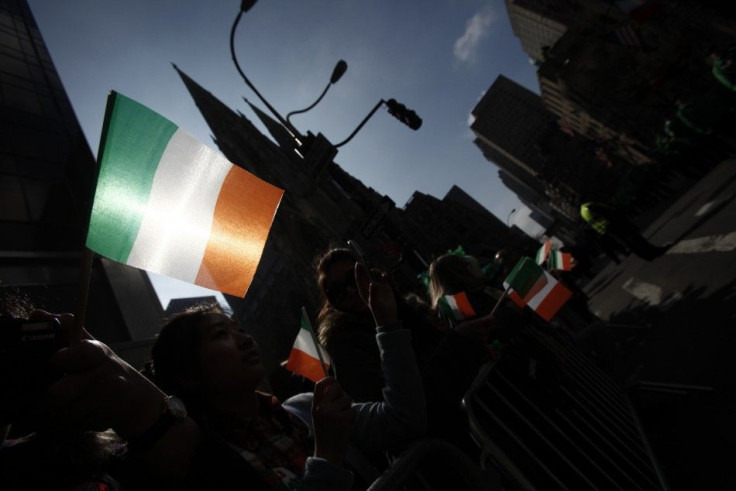Pope Benedict Resigns: Why Has There Never Been An Irish Pope?

Of the 272 Popes since the very first one, St. Peter, an overwhelming 80 percent (or 217) were Italian. This makes sense since Rome has been the seat of Catholicism and the College of Cardinals were usually dominated by Italians.
The French (13), Greeks (13), Germans (8), and Syrians (6) have contributed the next highest numbers of Holy Fathers.
There have also been Popes from North Africa, England and Poland.
However, there have only been two popes each from two of the most Catholic nations of earth: Spain (Pope Alexander VI and Pope Callixtus III) and Portugal (Pope Damasus and Pope John XXI).
Perhaps most surprisingly, not a single pope has ever come from a country that is the most heavily identified with the Catholic Church – the Republic of Ireland.
If Cardinal Timothy Dolan of New York is elevated to the papacy, he would be the first Holy Father of Irish descent – but he’s considered a long shot (a 25-to-1, according to PaddyPower, the Irish bookmaker).
Still, Dolan is the one descendent of Erin with the best chance to secure the Vatican’s throne among the current possible list of candidates.
Following Dolan are Cardinal Raymond Burke, the archbishop of St. Louis (33-to-1); Cardinal Keith O’Brien, the Northern Ireland-born Archbishop of St Andrews and Edinburgh in Scotland (33-to-1); and Archbishop Diarmiud Martin, the Roman Catholic Archbishop of Dublin and Primate of Ireland, (66-to-1),
Then comes Cardinal Cormac Murphy-O’Connor, the English-born Archbishop Emeritus of Westminster, who has an even less of a chance – 150-to-1, PaddyPower says.
Part of the minimal chances given to potential popes from the Emerald Isle may be tied to the sordid child sex abuse scandal that has torn asunder the Irish church in recent years.
Nonetheless, Archbishop Martin has been widely admired for his willingness to face up to the magnitude of the sex abuse crisis in Ireland and to take responsibility for it.
During his homily in 2009, Martin declared: "It is likely that thousands of children or young people across Ireland were abused by priests in the period under investigation and the horror of that abuse was not recognized for what it is. The report [on the abuse] will make each of us and the entire church in Dublin a humbler church.”
He subsequently told Irish media: “There is always a price to pay for not responding. The church will have to pay that price in terms of its credibility. The first thing the church has to do is to move out of any mode of denial.”
Regarding the chances of Diarmiud Martin, as long ago as May 2010, he was seen as a “contender” for the papacy by U.S. media.
The National Catholic Reporter at the time said Martin “arrives as a fresh voice, unencumbered by any involvement in the [sex abuse] scandal. So far he has rendered a sober and honest assessment of the crisis and its causes.”
The paper added: “Perhaps Ireland, so thoroughly Catholic and so deeply shaken by the scandals there, could be the place where a new ecclesiology [theological study of the Christian Church] surfaces, one that is more inclusive and transparent than the royal model that is in decline. Perhaps [Ireland] could be the birthplace of an ecclesiology that is humbler, not in a humiliated way, but in a way that takes stock of what a Christian community should be and how it should be present to the world.”
The existence of an Irish pope was also speculated upon in a recent fictitious novel, “Le Pont Des Anges” by Philippe le Guillou.
This document fantasizes that an Irish Benedictine monk named Tom Sullivan who endorses priests getting married, is elected to the Holy See by the middle of the century. In the tale, he drinks frequently in a pub in Donegal and even survives a murder attempt.
Le Guillou had earlier penned a book about the first Black African pope. In the latest novel, which is a continuation of the first, the Irishman succeeds the black pope as Clement XV.
Father Andrew Nugent, a Glenstal monk and crime novelist, who wrote about the novel, commented in the Irish Times: “[Pope Clement] is… a compromise between a first-world candidate and one from the impoverished third world. The reader must determine where Ireland lies on a spectrum from highly developed nations to banana republics.”
Perhaps there are some other reasons regarding the absence of Irishmen in the papacy.
According to a report in the Irish Independent newspaper, when Richard Cushing, the Archbishop of Boston, was lying near death in a hospital, he was visited by the Irish ambassador to the US.
When their conversation turned to a discussion of the state of Catholic Church, Cushing reportedly told the envoy: "The Vatican does not give a damn for Ireland… because Ireland has no money."
Cardinal Cushing, a close confidante of the Kennedys, died in 1970.
© Copyright IBTimes 2024. All rights reserved.











